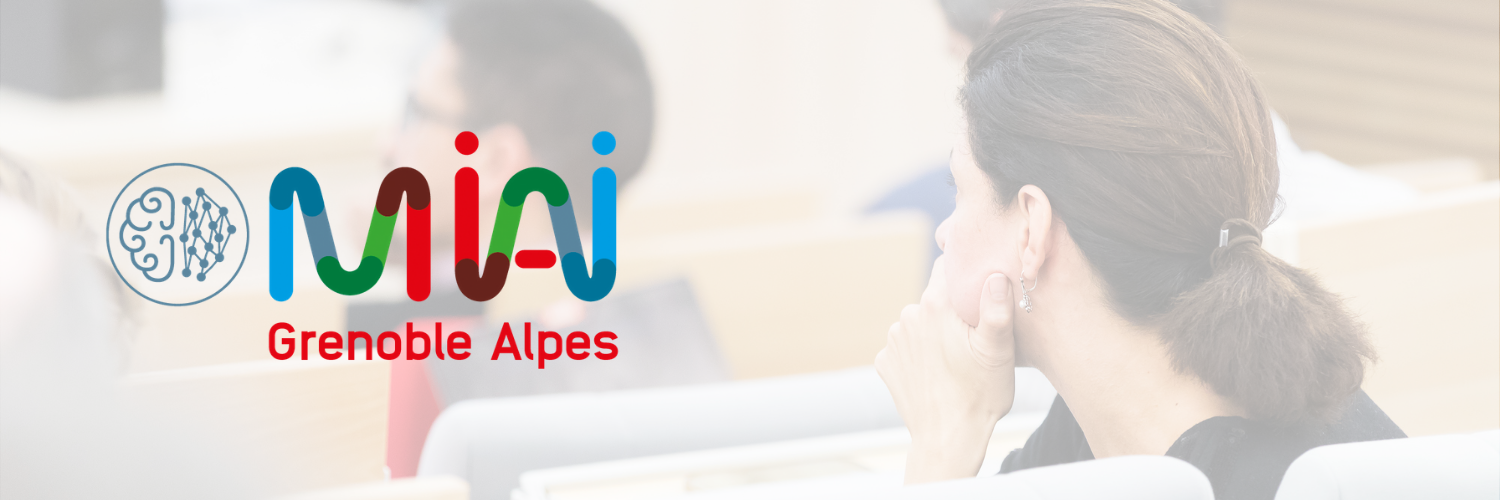EFELIA-MIAI
EFELIA-MIAI : Education in Artificial Intelligence

GOAL
Our goal is to increase the number of people having skills in AI technologies. To this end, we propose to create two main programs that would officially qualify practitioners of AI technologies. These programs are open to registered students and also other people having prerequisite skills. More precisely, we aim to create a professional qualification in AI. This qualification will be transversal to existing diplomas. It will be issued by the MIAI Grenoble Alpes institute and will certify the acquisition of theoretical and practical skills and aptitudes in AI.All courses (short or long cycles) will be open to people outside the university, subject to the demonstration of the required capacities and the available places. We estimate that with the development of AI labels and the creation of these programs, the number of people graduating in AI (AI label and integration) will increase from around 300 in 2018 to 500 in 2022, and that the number of graduates from application areas (AI practices and application) will increase from around 400 in 2018 to 900 in 2022. We therefore expect to double the number of people with AI skill in these two levels (from 700 in 2018 to 1,400 in 2022). We estimate 40, the number of professionals who will take on-demand courses each year.
700 STUDENTS CURRENTLY TRAINED IN AI
As mentioned above, 700 students are currently having AI courses in Grenoble as part of their academic programs in AI technologies and applications. However, the aspects of AI taught today are specific to each degree, limiting both the multidisciplinarity and validation of AI skills acquired individually by students. This organization also prevents the sharing of resources, especially with regard to the practices of AI technologies. We aim to improve the visibility, attractiveness and consistency of this offer thanks to a new approach of training courses in AI.THE LABEL "PROFESSIONAL QUALIFICATION IN ARTIFICIAL INTELLIGENCE"
We have created the label called “Professional qualification in artificial intelligence” and issued by MIAI which attests the acquisition of theoretical and practical skills in artificial intelligence. This label is accessible via blocks of skills that are transversal to existing diplomas. Two sub-categories will be considered: AI core and integration, corresponding to the exploitable knowledge in the main thematics of AI (algorithms for AI, machine learning, symbolic reasoning, computer vision, robotics, natural language processing , multi-agent systems, etc.) and AI practices and applications, corresponding to exploitable knowledge in the use of AI for disciplinary fields such as health, environment, energy, mobility, industry 4.0, management, etc. The demand in these two fields is high and we anticipate a significant increase in the number of students seeking an AI label in addition to their diploma.REQUIREMENTS FOR MIAI LABELS
AI labels are articulated with accredited diplomas and will include practical sessions in AI. At Bachelor and Master levels, obtaining an AI label depends on the successful validation of a certain number of courses (measured by the European Credit Transfer Scale - ECTS). For doctoral students, this requirement corresponds to the (estimated) time spent on research and training in fields related to AI.To improve exploitable knowledge, there will be a need for practical sessions in AI. This practical sessions can be done within the framework of existing courses or within the framework of hackatons defined with industrial partners and for which MIAI will provide data and test environments. MIAI will also manage "AI innovation projects" for which industrial partners or students propose projects focused on short-term prototypes. Promising projects will be presented during the annual MIAI days.
THE FORMATS OF CYCLES
THE TWO PROFESSIONAL LABELS ARE ACCESSIBLE ACCORDING TO THREE MODALITIES:
- Short training cycles in AI in which the courses, coordinated by MIAI, are given over a limited period, specifically to people from the socio-economic world. Cross-cutting to existing accredited degrees, these AI courses are open to students of all disciplines;
- On-demand courses (short training courses in AI), coordinated by MIAI, to meet the training needs of companies or institutions in AI (in a perspective of lifelong learning);
- Long training cycles in AI are articulated with existing accredited diplomas. Disciplinary programs will increase the integration of AI into their trainings in order to enable students to achieve professional qualification in AI. In each diploma, courses with AI content will be identified with their respective contribution to the AI ??qualification (in working hours or ECTS).
FORMATS OF THE CYCLES TO BE DEVELOPED:
- Bachelor program dedicated to AI;
- Master Track, as part of the existing Master in computer science applied to business administration, devoted to data management and business intelligence;
- Master's program in Business and Artificial Intelligence (MBAI), jointly developed by Grenoble Ecole de Management and the Institute of Business Administration of the University Grenoble Alpes;
- Professional Masters course, co-designed with our industrial partners within the existing Masters in computer science and applied mathematics, on practical AI. During their final year, the selected students will take courses for one third of their time and work in a company for the remaining two thirds;
- Creation of modules in existing programs, especially in AI application areas such as health, environment, industry, commerce and administration, law, humanities and social sciences.
Published on September 20, 2023
Updated on April 29, 2024
Updated on April 29, 2024
Contact us
Kim Thang Nguyen
Education Director of the MIAI Institute, in charge of the education board.
Kim-Thang.Nguyen@univ-grenoble-alpes.fr
Thnimphorn Courant
EFELIA-MIAI Project Manager
Thnimphorn.Courant@grenoble-inp.fr
Anatoli Juditsky
Professor at Grenoble Alpes University, Co-responsible for the educational board
Anatoli.Juditsky@univ-grenoble-alpes.fr
Master scholarships
Proposals for Master 2 Interships
EDUCATION
- EFELIA-MIAI Education board/ Bureau formation
- Executive Educations / Formations pour les salariés
- Long programs/ Formations pour les étudiants
- Open training resources/ Ressources gratuites
- Ressources pour enseignants du secondaires
- M1 & M2 Internships/ Stages
- Master scholarships/ Bourses
- BTS Scholarships/ Bourses


